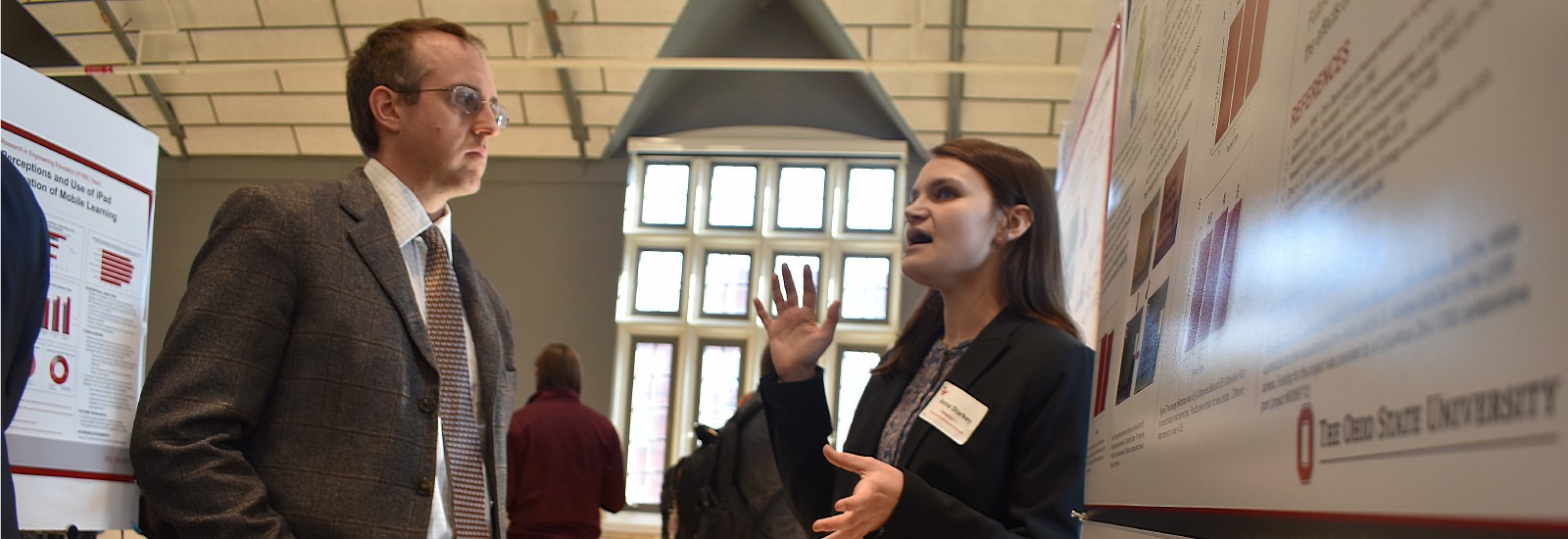By: Meredith Oglesby
Each year during the Richard J. and Martha D. Denman Undergraduate Research Forum, Ohio State students illuminate the future of their respective fields through innovative and enriching research. This year during the 25th anniversary of the forum, undergraduate students showcased their outstanding research, scholarship and creative activity.
This spring, Sustainability Institute faculty and staff judged student presentations from diverse disciplines and student interests — all surrounding the topic of sustainability. The Sustainability Institute was proud to recognize the top undergraduate students who excelled in conducting research in the area of sustainability.
“We are glad to have the opportunity to recognize undergraduate researchers in this way through our partnership with the Denman,” Gina Jaquet, Sustainability Institute director of education and learning, said. “Every year, we meet excellent, creative scholars through this event. A special congratulations to the three winners of the Sustainability Institute sustainability research award for 2020.”
The top three projects are:
David Liu, biochemistry: Broadband Blue Emission in Cs2ZrCI6 and Cs2HfCi6 Phosphors
Lighting accounts for 15% of global electricity usage, and this problem equates to the use of low-efficiency incandescent bulbs, which haven’t changed much over the past century. Solid state lighting represents a new, energy efficient alternative. However, current light emitting diodes (LEDs) have deficiencies in the blue spectral region. Liu synthesized and investigated a pair of vacancy-ordered perovskites (Cs2HfCl6 and Cs2ZrCl6), which are doped with Bi3+ to induce luminescence. The researchers developed a series of perovskite materials that show promise for efficient blue luminescence.
Jacob Riina, molecular genetics: Engineering Zea Mays Colonizing Bacteria for Nitrogen Fixing Ability
Riina’s research focuses on nitrogen fixation ability in zea mays, which is a type of maize or corn. Nitrogen bioavailability is often the primary growth limiting factor in plants. As a consequence, high volumes of fertilizer are applied to crop plants to meet demand. Nutrient uptake this way proves inefficient. Riina concludes that a Pseudomonas species or any other plant colonizers imbued with nitrogen fixation would make Ohio and United States agriculture much more environmentally sustainable and profitable, by eliminating heavy dependence on fertilizers
Anna Starkey, evolution and ecology: Investigating the Impacts of Soil Quality on Floral Color and Pollinator Perception
The objective of Starkey’s study was to determine if land previously used for surfacing mining affects the light intensity, reflectance, transmittance and pollinator perception of floral resources. The researchers found that across sites with different reclamation permits, reflectance values of visible and ultraviolet blue on standard and keel petals were significantly different, and sites from mid-aged reclamation permits have higher values. Visible green values from the keel petals were also significantly different between permit types, with newer permits having higher values. These results provide information for future restoration efforts by determining the impacts of reclamation methodology on soil quality and ultimately on plant fitness as mediated through plant-pollinator interactions.
Student finalists were judged by Sustainability Institute faculty and staff. The Sustainability Institute core faculty judges included: Jordan Clark, civil engineering and geodetic engineering, Scott Demyan, School of Environment and Natural Resources, and Chris Rea, John Glenn College of Public Affairs. Jaquet served as the Sustainability Institute staff judge and presented award certificates to these three students at the awards reception on March 5.
Congratulations to the Sustainability Institute award winners from this year’s Denman Undergraduate Research Forum.
Meredith Oglesby is a communication assistant at the Sustainability Institute.
